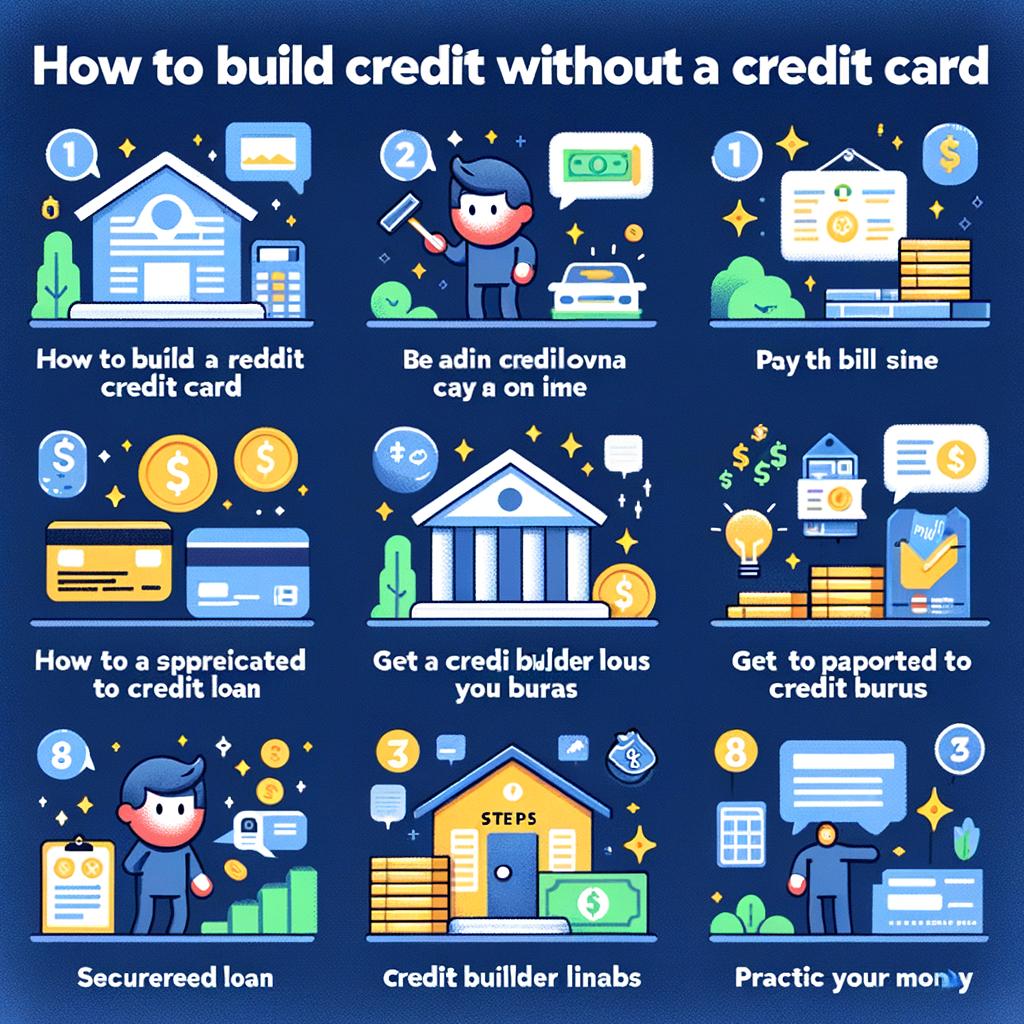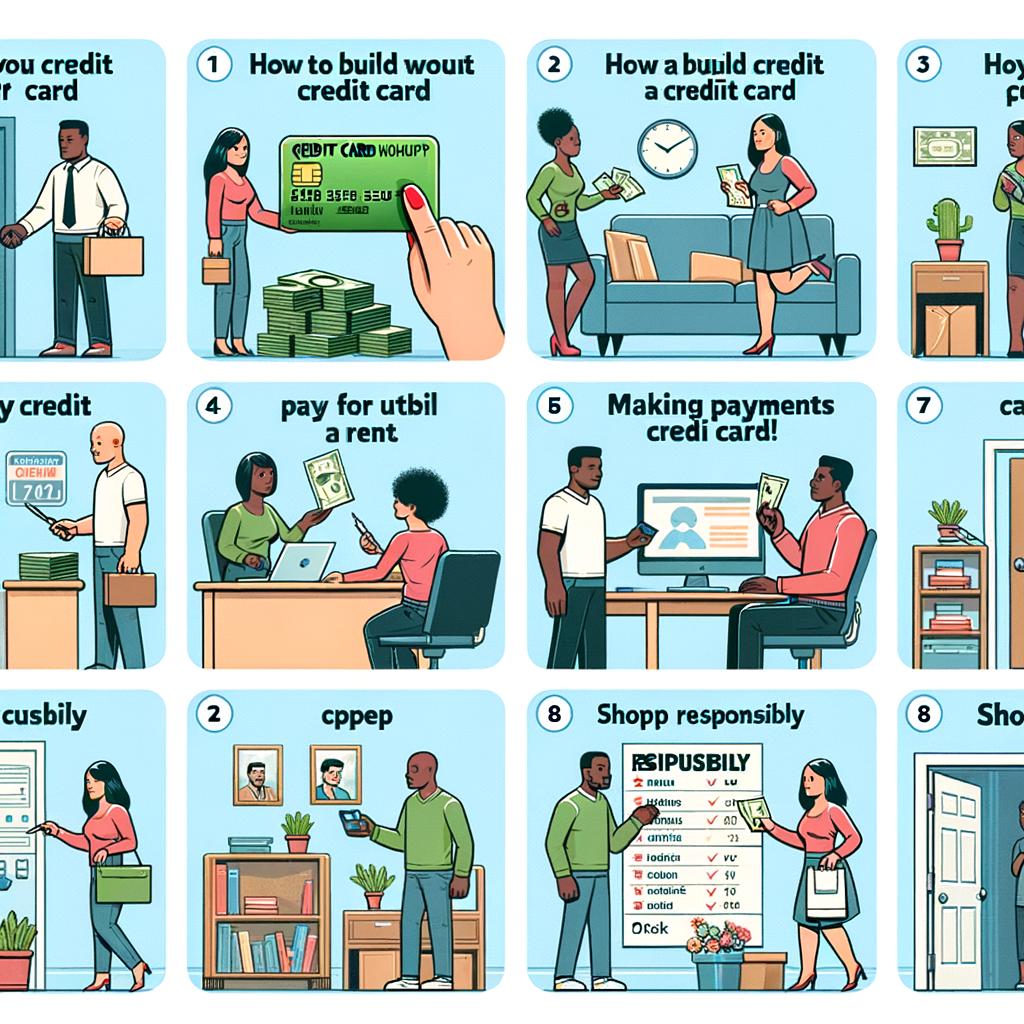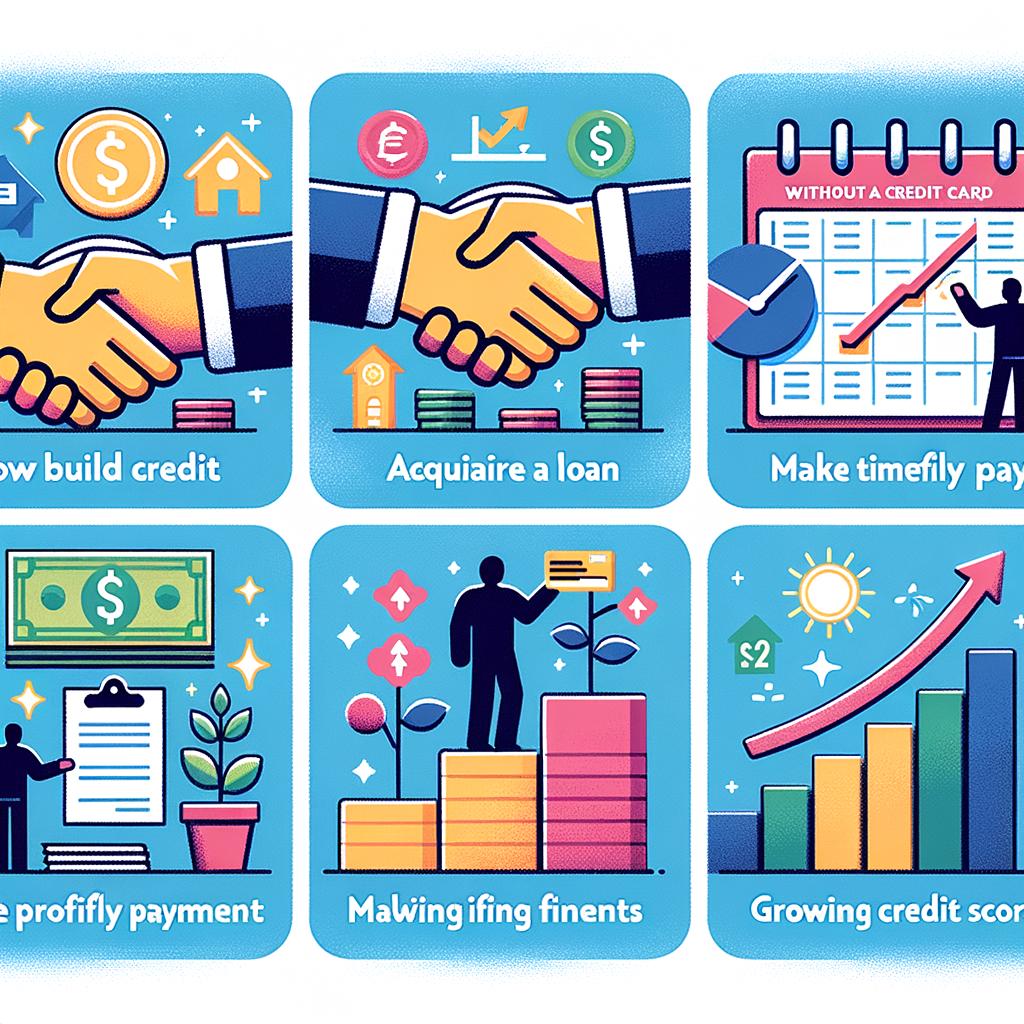In the intricate dance of personal finance, credit cards often take the spotlight, leading many to believe that they are the only path to building credit. However, this assumption leaves a vast array of alternatives in the shadows, each offering its own rhythm and grace in the grand performance of credit building. If you’ve ever found yourself hesitant to step onto the stage with a credit card, or simply prefer to explore different melodies, you’re not alone. This guide will take you on a journey through the lesser-known, yet equally powerful, avenues for establishing a robust credit profile without swiping plastic. From rent payments to installment loans, discover the symphony of options that can help you compose a credit score worth applauding.
Table of Contents
- Strategies for Establishing Creditworthiness Through Alternative Methods
- Unlocking the Potential of Secured Loans for Credit Building
- Utilizing Rental Payments to Boost Your Credit Score
- Leveraging Utility Bills to Demonstrate Financial Responsibility
- Q&A
- Wrapping Up

Strategies for Establishing Creditworthiness Through Alternative Methods
Building credit without a credit card may seem challenging, but there are creative ways to establish your creditworthiness. Alternative methods might not be as widely known, but they offer viable options for tech-savvy individuals or those who prefer avoiding traditional credit paths.
1. Utilize Experiential Payments: Services like Experian Boost™ can help elevate your credit score by including everyday payments such as utility bills and streaming services. With a few clicks, link your utility and telecommunications accounts directly to Experian Boost™, and it will promptly reflect in your credit history.
- Water and gas bills
- Electricity payments
- Subscription streaming services
2. Apply for a Credit-Builder Loan: A credit-builder loan is designed specifically to help individuals build credit. Unlike traditional loans, the amount you borrow is held in a secured account while you make fixed payments over a specific term. Once the term ends, you receive the loaned amount, and your positive payment history is reported to the credit bureaus.
| Institution | Loan Amount | Term |
|---|---|---|
| Local Credit Union | $500 | 12 Months |
| Online Lender | $300 | 6 Months |
3. Report Rent Payments: Services like RentTrack and Cozy allow tenants to report their monthly rent payments to credit bureaus. This consistent payment behavior can positively impact your credit score.
4. Become an Authorized User: Ask a trusted friend or family member to add you as an authorized user on their existing credit card account. Their strong payment history can help boost your credit score, albeit without you actually managing the account.
5. Personal Loans from a Bank or Credit Union: Applying for a small personal loan from a bank or credit union can help build credit. Ensure you make timely payments, as these are reported to the credit bureaus.
6. Use Peer-to-Peer Lending: Platforms like LendingClub offer loans funded by individual investors. The loan terms are similar to traditional loans, and timely repayments contribute to your credit profile.
7. Secure Your Utilities: Some utility companies report customer payment history to credit bureaus. Check with your provider and ensure on-time payments for water, gas, and electricity can help you build solid credit.
These strategies highlight non-traditional yet effective methods of building credit. By leveraging these alternatives, you can establish a positive credit history without relying on a credit card.

Unlocking the Potential of Secured Loans for Credit Building
Secured loans offer a lesser-known but powerful way to establish or improve your credit score. By leveraging assets like savings accounts, vehicles, or other valuable property, you can secure a loan that helps build your credit profile over time. This approach is ideal for those who lack access to traditional credit cards or wish to diversify their credit-building strategies.
Why Choose Secured Loans?
- Lower Risk for Lenders: Since the loan is backed by collateral, lenders face reduced risk and are often more willing to offer loans to those with little or poor credit history.
- Better Interest Rates: Secured loans often come with lower interest rates compared to unsecured loans, making repayment easier and more affordable.
- Credit Mix: Having a variety of credit types can positively impact your credit score, and a secured loan adds another layer of diversification.
Types of Collateral You Can Use
Various assets can serve as collateral for a secured loan. Here are some common types:
- Savings Account: A common choice, as you can usually secure a loan from the same bank where you hold your savings.
- Vehicle: Using your car, truck, or motorcycle as collateral is also a viable option.
- Property: Real estate or other valuables can be used, though this may involve more rigorous vetting by the lender.
How It Works
To obtain a secured loan and start building your credit, follow these steps:
- Identify a suitable asset for collateral.
- Research and compare lenders who offer secured loans.
- Submit your application along with the necessary documentation.
- Use the loan responsibly by making timely payments.
- Monitor your credit score over time to track your progress.
Importance of Timely Payments
Timely repayment is critical in maximizing the credit-building benefits of a secured loan. Late payments or defaults can negatively affect your credit score and result in the loss of your collateral. Set up automatic payments or reminders to ensure you never miss a due date.
Creating a Financial Plan
Before taking out a secured loan, it’s wise to create a comprehensive financial plan:
- Budget: Allocate funds from your income for loan repayments.
- Emergency Fund: Maintain a cushion to cover unexpected expenses, ensuring your loan repayments are unaffected.
- Goals: Define short-term and long-term financial goals to keep you motivated and focused.
Tracking Your Progress
Keep an eye on your credit report and score by using free credit monitoring services. Regularly check for errors and make sure all your payments are being reported correctly. This proactive approach can help you spot issues early and address them promptly.
Comparing Secured Loan Options
| Lender | Interest Rate | Loan Amount | Collateral |
|---|---|---|---|
| Bank A | 4.5% | $5,000 - $50,000 | Savings Account |
| Credit Union B | 3.9% | $2,000 – $25,000 | Vehicle |
| Online Lender C | 5.2% | $1,000 – $15,000 | Property |
Secured loans, when managed responsibly, are an effective way to build and maintain a healthy credit score, expanding your financial options for the future. It’s time to unlock this potential and take your credit to new heights.

Utilizing Rental Payments to Boost Your Credit Score
Did you know that paying your rent on time can positively influence your credit score? Many people are unaware that their rental payments can be used to establish and improve their financial credibility. While typically, rent payments aren’t reported to the major credit bureaus, there are ways to ensure this regular financial commitment works in your favor.
First and foremost, you need to enlist the help of a rent-reporting service. These services act as intermediaries between you and the credit bureaus, ensuring that your timely payments are recorded. There are various services available, so it’s essential to choose one that suits your needs.
| Service Name | Monthly Cost | Credit Bureaus Reported To |
|---|---|---|
| RentTrack | $6.95 | Experian, TransUnion |
| Rental Kharma | $8.95 | TransUnion, Equifax |
| RentReporters | $9.95 | Equifax, Experian |
Consistency is key. Just like with credit card payments, late rent payments can have an adverse effect if your rent is reported. Make paying your rent on time a priority to ensure that it reflects positively on your credit report.
Additionally, negotiate with your landlord or property management company. Some rent-reporting services require landlord verification to authenticate your payments. Having a cooperative landlord can smooth the process, ensuring faster and more accurate reporting.
- Budget Wisely: Allocate your funds to prioritize rent payments.
- Set Reminders: Use apps or calendar alerts for payment deadlines.
- Automate Payments: Many banks offer services to automate recurring payments.
Rent payments can particularly benefit those with a ’thin credit file’, which means individuals who have a limited credit history. By adding your rental payment history, you can create a more robust credit profile, showcasing reliability and financial responsibility.
Often, significant credit boosts can be seen within six months to a year of consistent rent reporting. Patience and perseverance will ensure your credit score reflects your diligent payment habits. Remember, improving your credit score is a marathon, not a sprint.
Utilizing your rental payments effectively can set the foundation for a strong financial future. Leveraging this often-overlooked aspect of personal finance can open doors to better interest rates and credit opportunities without relying on traditional credit cards.

Leveraging Utility Bills to Demonstrate Financial Responsibility
One often overlooked method to build credit without a credit card involves leveraging utility bills. Regularly paying for utilities such as electricity, water, gas, internet, and even phone bills can effectively reflect your financial responsibility. While these payments don’t traditionally impact your credit report directly, certain services can help translate these payments into positive credit activity. Here’s how you can make your utility bills work for you:
Firstly, consider using third-party services like Experian Boost. This free tool allows you to connect your bank accounts to Experian, highlighting your consistent utility and telecom payments. The payments are then factored into your credit score, potentially giving you a boost.
Similarly, check out services like LevelCredit or RentTrack, which report your rent and utility payments to major credit bureaus. If you’re already a responsible payer, these services can be a hassle-free way to get credit for bills you’re already managing.
When leveraging utility payments to build credit, ensure they are timely and consistent. Missed or late payments can still have adverse effects if they are reported negatively. Therefore, setting up automatic payments can be a smart strategy to ensure you meet every due date without fail.
To make the most of this strategy, it’s essential to understand which utility companies participate in these reporting programs. Below is a brief table showcasing common utility types and their usual participation:
| Utility Type | Reporting Possible? |
|---|---|
| Electricity | Yes |
| Water | Yes |
| Gas | Yes |
| Internet | Yes |
| Phone | Yes |
It’s crucial not to overlook smaller, recurring bills either. Services such as streaming subscriptions or even digital memberships can also be factored into some credit-building platforms. Review your monthly expenditures and see where else you might be able to gain credit.
Additionally, keep an accurate record of all your utility payments. This can be particularly beneficial if you decide to appeal any discrepancies on your credit report. Detailed records can serve as proof of your financial reliability and help resolve potential issues more efficiently.
Lastly, relying on utility bills for building credit can be an excellent bridge to obtaining a more robust credit profile. Over time, displaying consistent and responsible utility payments can help ease the process of eventually acquiring loan approvals or even qualifying for a credit card designed for newcomers.
Q&A
Q&A: How to Build Credit Without a Credit Card
Q: Is it possible to build credit without using a credit card?
A: Absolutely! While credit cards are a popular method for building credit, they’re not the only way. Several alternative strategies can help you establish and improve your credit history.
Q: What are some initial steps I can take to start building my credit?
A: One of the first steps is to ensure your name appears on official documents like utility bills or rental agreements. Timely payments of these accounts can be reported to credit bureaus, contributing positively to your credit profile.
Q: How can paying rent help build my credit?
A: Rent payments can be a powerful credit-building tool. By using services that report your timely rent payments to credit bureaus, you can demonstrate financial responsibility similar to what you would show with a credit card.
Q: What role do credit-builder loans play in building credit?
A: Credit-builder loans are specifically designed to improve your credit. They work by lending you a small amount of money that is held in a secured account while you make regular payments. Once repaid, the funds are released to you, and your payment history is reported to the credit bureaus, boosting your credit.
Q: Can secured loans help build credit too?
A: Yes, secured loans, such as auto loans or home equity loans, require collateral but can significantly aid in building credit. Regular, timely payments on these loans demonstrate your reliability to lenders.
Q: How important are student loans in the credit-building process?
A: Student loans, often among the first major debts for many individuals, play a crucial role. Making consistent, on-time payments can significantly enhance your credit score, showing lenders your ability to manage long-term debt responsibly.
Q: Are there other types of loans or products that can help build credit?
A: Personal loans and other installment loans also assist in building credit when paid on schedule. Additionally, some banks and credit unions offer small, low-interest loans or credit-building products tailored to professionals starting their credit journey.
Q: Can becoming an authorized user on someone else’s credit account benefit me?
A: Being added as an authorized user to a trusted family member’s or friend’s credit card can help. The account’s positive payment history can reflect on your credit report, aiding in building your credit without applying for a card yourself.
Q: How does responsible bill payment affect credit building?
A: Timely payment of any regular bills—utilities, internet, phone—can contribute to building a solid credit history. Some services offer to report your payment history to credit bureaus, which can positively affect your credit score.
Q: Are there any pitfalls I should be aware of when building credit this way?
A: While these methods are useful, they require diligent management. Ensure that all payments are made on time and that you monitor your credit reports regularly. Missteps, like missed payments, can hurt your credit rather than help it.
Q: Can tracking my credit score impact my credit-building process?
A: Regularly monitoring your credit score allows you to track progress and catch potential errors early. Many financial institutions and services offer free credit score tracking, helping you stay informed and proactive in managing your credit health.
Building credit without a credit card is not only possible but can be a smart way to demonstrate financial responsibility across various types of accounts. With consistent effort and careful management, a strong credit history can be achieved through alternative routes.
Wrapping Up
As we come to the end of our credit-building journey, it’s clear that the path to a robust financial future isn’t limited to just plastic cards. Whether it’s through strategic use of installment loans, leveraging rental payments, or tapping into the power of secured loans, there are numerous avenues to construct a healthy credit profile. By adopting these techniques, you can sculpt a credit score that stands tall and resilient, ready to support your financial dreams. So, embark on this journey with confidence, knowing that your future self will thank you for the groundwork you lay today. Every step you take is a stride toward financial empowerment. Happy credit-building!
